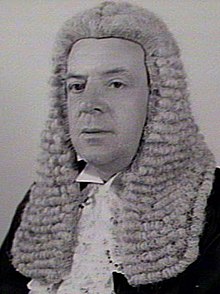William Dickson (Australian politician)
 From Wikipedia - Reading time: 6 min
From Wikipedia - Reading time: 6 min
William Dickson | |
|---|---|
 | |
| 12th President of the New South Wales Legislative Council | |
| In office 18 August 1952 – 22 May 1966 | |
| Deputy | Thomas Steele Ernest Gerard Wright |
| Preceded by | Ernest Farrar |
| Succeeded by | Harry Budd |
| NSW Minister for Building Materials | |
| In office 9 March 1948 – 15 August 1952 | |
| Premier | Jim McGirr Joseph Cahill |
| Preceded by | Claude Matthews |
| Succeeded by | Portfolio abolished |
| NSW Minister for Secondary Industries | |
| In office 30 June 1950 – 15 August 1952 | |
| Premier | Jim McGirr Joseph Cahill |
| Preceded by | Portfolio created |
| Succeeded by | Portfolio abolished |
| NSW Secretary for Mines | |
| In office 21 September 1949 – 30 June 1950 | |
| Premier | Jim McGirr |
| Preceded by | Jim McGirr |
| Succeeded by | Joshua Arthur |
| Member of the New South Wales Legislative Council | |
| In office 23 December 1925 – 22 April 1934 | |
| Appointed by | Sir Dudley de Chair |
| In office 23 April 1934 – 22 May 1966 | |
| Succeeded by | Norman Boland |
| Personal details | |
| Born | 26 April 1893 Widnes, Lancashire, England |
| Died | 22 May 1966 (aged 73) Vaucluse, New South Wales, Australia |
| Political party | NSW Labor Lang Labor Industrial Labor Party |
| Education | Farnworth Grammar |
William Edward Dickson (26 April 1893 – 22 May 1966) was an English-born Australian politician.[1][2]
Early life
[edit]Dickson was born at Widnes in Lancashire to alkali labourer Edward Dickson and Bertha Stancliffe. He migrated to Australia in 1913 and worked as an accountant for a mine in Broken Hill. He lost his job after opposing conscription during World War I, and worked as a labourer and then as manager of the Barrier Daily Truth. On 22 October 1922 he married Alice Celia Cogan, with whom he had five children.[1]
Political career
[edit]He then moved to Sydney, and from 1925 to 1934 was a Labor member of the New South Wales Legislative Council. Involved in Bob Heffron's Industrial Labor Party, he soon returned to the ALP and was general secretary from 1940 to 1941 and campaign director from 1940 to 1952. He returned to the Legislative Council in 1940, where he would remain until his death. He was an assistant minister from 1941 to 1948, and from 1948 to 1952 was Minister for Building Materials, with his title changed to include additional responsibilities as Minister for Secondary Industries from 1950. In 1949 he was appointed Secretary for Mines in addition to his previous portfolios. He resigned from the ministry in 1952 when he was elected President of the Legislative Council. He retained the presidency until his death at Vaucluse in 1966.[1]
References
[edit]- ^ a b c "Mr William Edward Dickson (1893-1966)". Former members of the Parliament of New South Wales. Retrieved 30 April 2019.
- ^ "Biography - William Edward Dickson - Labour Australia". labouraustralia.anu.edu.au. Australian National University. Retrieved 29 September 2024.
 KSF
KSF
